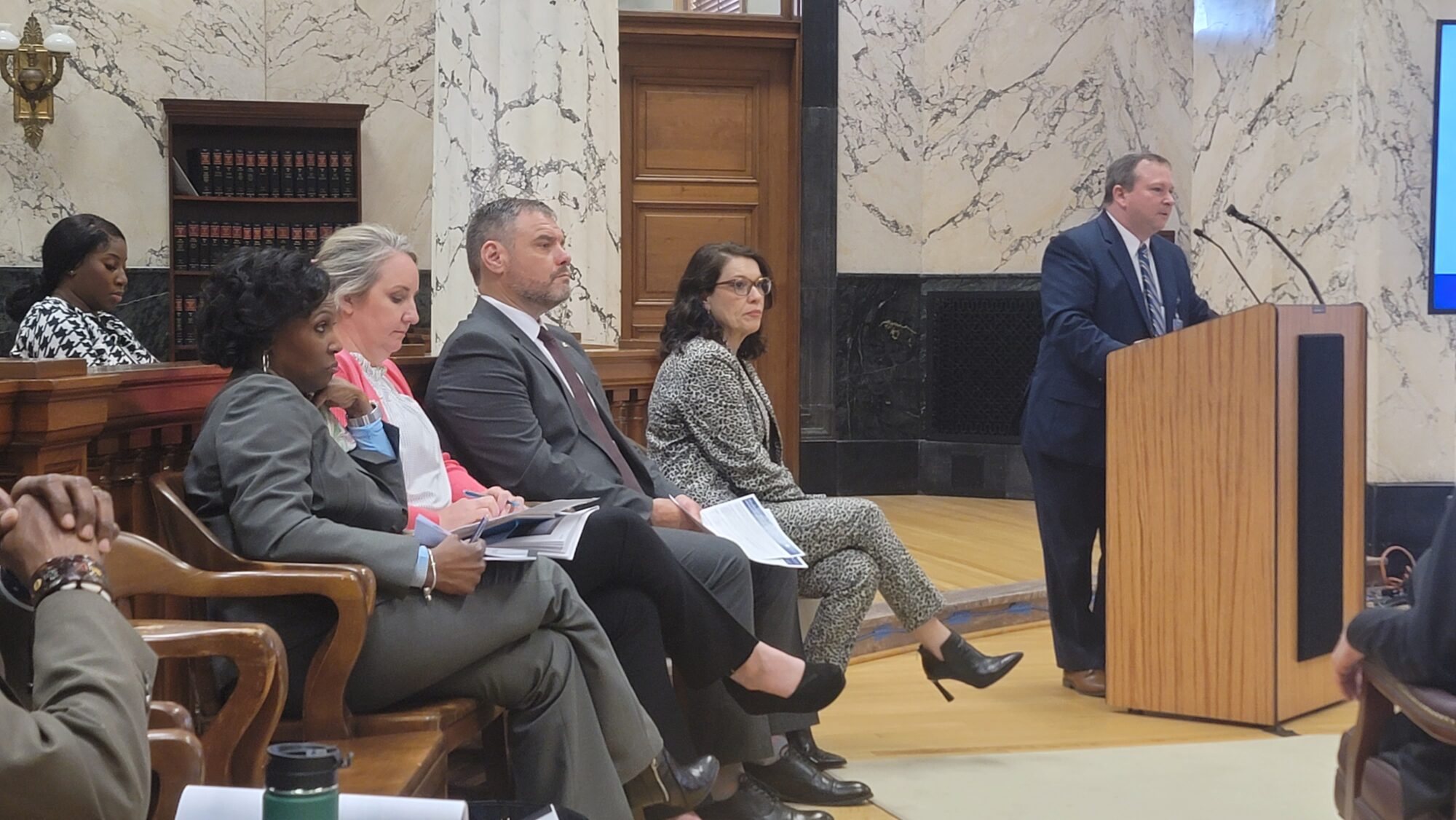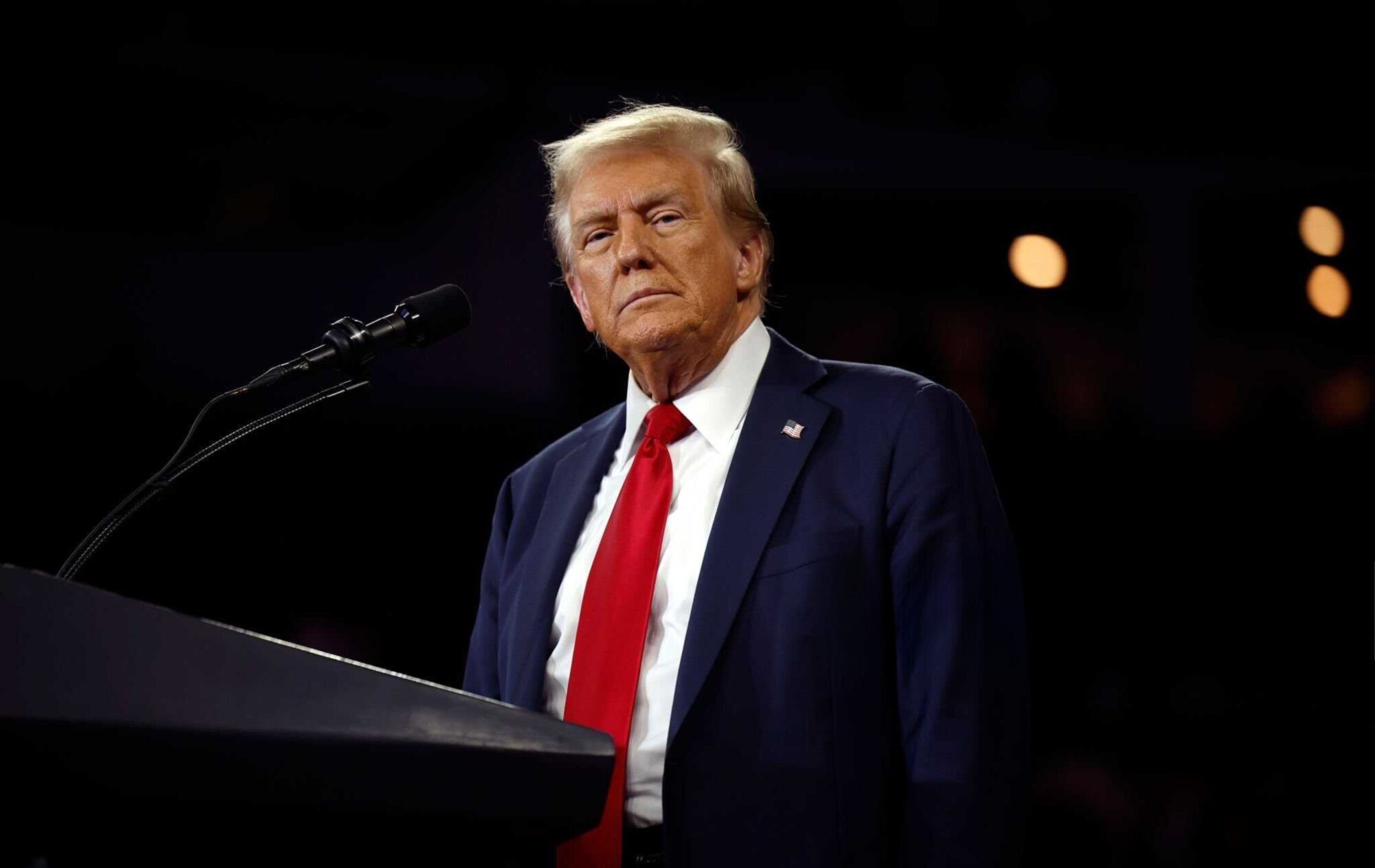
From left are Dr. Felicia Gavin, MDE's Chief of Operations, Legislative Liaison Holly Spivey, incoming State Superintendent Dr. Lance Evans, MDE Chief Accountability Officer Dr. Paula Vanderford and Interim State Superintendent Dr. Raymond Morgigno as they address the Senate Education Committee Thursday morning. (Photo Jeremy Pittari | Magnolia Tribune)
States around Mississippi, including Louisiana, Arkansas and Alabama, have all passed education savings account legislation that allows students to decide for themselves whether to attend public or private school. The laws reflect both dissatisfaction with the status quo and a recognition that families, not the government, should bear the ultimate decision on how best to educate their children.
Pressed on Monday for his take on the growing demand for school choice, new State Superintendent of Education, Lance Evans, reiterated that he is a public school man before telling the audience assembled at The Stennis Institute luncheon that if public funds are spent on education savings accounts then private schools must be subjected to the same accountability measures as public schools:
“I do believe if one single dollar of public money goes into a private school, then every single child in that school has to be subjected to the same assessment of every single student in public school,” said Evans.
The statement demonstrates a lack of understanding of the purpose of public funding for education, the manner in which education savings accounts operate, and the efficacy of the current public school accountability model.
First, the point of public funding of education is to educate children and prepare them for life, not fund any one system. If a child would receive a better education in a setting other than his or her local public school, then publicly funding that education perfectly comports with the stated purpose of publicly funded education. Conversely, if a child would receive a worse education being forced to remain in his or her local public school, the state is acting in a manner counter to the purpose of public funding.
Second, public monies would not be appropriated to private schools. Education savings accounts, unlike “vouchers,” are funds designated for use in educating individual children. Where a voucher is specifically for tuition, an education savings account can be used on an assortment of options such as tutoring, books, software or online resources.
In other words, funds do not flow directly from the state to private schools, but rather, from the state to families — who are then free to make their own decisions about how best to educate their students.
Third, education savings account programs in other states all have accountability measures built in, usually in the form of what is called a national norm reference test, which allows for a child’s progress to be compared to peers. Evans appears to take it one step further in suggesting that private school students not participating in an education savings account should be subjected to state assessments if even one of their classmates is an ESA student. This would amount to an extreme and disproportionate overreach.
Placing private schools under the same accountability model as public schools would defeat the purpose of education choice. One of the underlying premises of these programs is that private schools, free from the constraints of top-down bureaucracy, can sometimes offer an education better suited to the individual child.
And before the state attempts to impose the public education system’s assessment-accountability model on private schools, it should weigh the efficacy of that model. Many public educators and parents feel like the current test-centric model impedes actual academic growth.
94 percent of Mississippi’s public school districts were awarded a C or higher for the 2023-2024 school year, but peer behind the curtain and the results leave much to be desired. In a recent op-ed in Magnolia Tribune, Wil Ervin of Empower Mississippi noted that:
- In one A-rated school district, less than 30% of students are proficient in reading, and only 41% are proficient in math.
- 16% of A-rated districts, and 13% of A-rated schools, had reading proficiency levels below 50%.
- Only 1 of the 50 B-rated districts (2%) had reading proficiency levels above 50%. 18% of B-rated districts had reading proficiency levels below 30%.
- 13% of B-rated high schools had reading proficiency levels below 30%.
- 9 B-rated high schools had reading proficiency levels below 30% and math proficiency levels below 50%.
High accountability grades for low performance may not be the standard the state wants to impose on others.
A Word on the Constitutionality of Education Choice
Anti-choice advocates, like Mississippi Today’s Bobby Harrison, continue to argue that education savings accounts are unconstitutional. The narrative is tired and misguided.
Mississippi has three school choice programs that provide students with resources to attend private schools presently in place. None of them have been challenged in court. None of these programs have been ruled unconstitutional.
In 2012, the Legislature passed the Mississippi Dyslexia Therapy Scholarship to provide vouchers to dyslexic students that could be used at public or private schools offering dyslexia therapy. In 2013, the Legislature enacted the Nate Rogers Scholarship for Students with Disabilities, a small program which allows students with speech disabilities to pursue speech therapy at private schools. Finally, the Equal Opportunity for Students with Special Needs program that passed in 2015 provides special needs students with an education savings account that gives them multiple options for how to spend the alloted resources.
All three of these programs have been annually funded by the Legislature. Again, without challenge. Perhaps opponents know that it would be a public relations nightmare to go after special needs children.
While Section 208 of the Mississippi Constitution prevents direct appropriation of state education dollars to private schools, it does not prevent giving families resources to make their own education decisions.
80 years ago the Mississippi Supreme Court considered a challenge under Section 208 of the Mississippi Constitution to a textbook program that used state education funds to purchase textbooks, including textbooks for children enrolled at private schools. In that case, the Court ruled that since the aid went to “individual pupils” the private schools were not the direct beneficiaries of the program and it was constitutional. The decision and its logic have remained untouched.
In more recent history, state courts across the country that have been called on to interpret their own constitutions in relation to education choice programs have almost universally reached the same conclusion — that there is a difference between a direct appropriation to a private school and an appropriation to a family that then makes its own election on how to spend the resources.
Legal decisions in Nevada, Indiana, Alabama, Wisconsin, Ohio, North Carolina, Illinois, and Arizona have all adopted the same essential logic. The Nevada Supreme Court explained when “public funds are deposited into an education savings account, the funds are no longer ‘public funds’ but are instead the private funds of the individual parent who established the account.” Similarly, the Indiana Supreme Court ruled that a voucher program did not violate a prohibition on funding religious schools because any tuition paid was the “private, independent selection bny the parents of a program-eligible student.”











